Related Research Articles
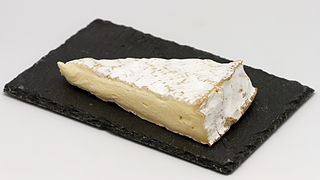
Brie is a soft cow's-milk cheese named after Brie, the French region from which it originated. It is pale in color with a slight grayish tinge under a rind of white mould. The rind is typically eaten, with its flavor depending largely upon the ingredients used and its manufacturing environment. It is similar to Camembert, which is native to a different region of France. Brie typically contains between 60% and 75% butterfat, slightly higher than Camembert.
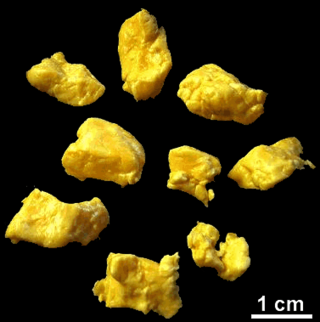
Cheese curds are moist pieces of curdled milk, eaten either alone or as a snack, or used in prepared dishes. They are consumed throughout the northern United States and Canada. Notably, cheese curds are popular in Quebec, as part of the dish poutine, and in Wisconsin and Minnesota where they are served breaded and deep fried. Curds are sometimes referred to as "squeaky cheese" or crottes de fromage.

Goat cheese, or chèvre, is cheese made from goat's milk. Goats were among the first animals to be domesticated for producing food. Goat cheese is made around the world with a variety of recipes, giving many different styles of cheese, from fresh and soft to aged and hard.

Cheesemaking is the craft of making cheese. The production of cheese, like many other food preservation processes, allows the nutritional and economic value of a food material, in this case milk, to be preserved in concentrated form. Cheesemaking allows the production of the cheese with diverse flavors and consistencies.
Romanian cuisine is a diverse blend of different dishes from several traditions with which it has come into contact, but it also maintains its own character. It has been mainly influenced by Turkish and a series of European cuisines in particular from the Balkans, or Hungarian cuisine as well as culinary elements stemming from the cuisines of Central Europe.
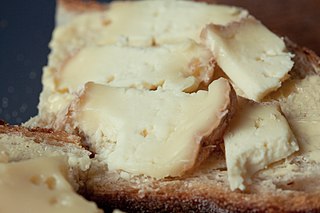
Ardrahan Farmhouse Cheese creates two varieties of cheese. They originate from Ardrahan Farmhouse, Kanturk, County Cork in Ireland. The two varieties are Ardrahan and Duhallow. Eugene and Mary Burns first made Ardrahan cheese on their farm in County Cork in 1983 using traditional techniques. Both varieties are made entirely from the milk of the Burns' cow herd, which is composed of Friesian cows.
Cooleeney Farm produces a number of cheeses from both cow's milk and goat's milk from their premises near Thurles in County Tipperary, Ireland.

Kurdish cuisine consists of a wide variety of foods prepared by the Kurdish people. There are cultural similarities of Kurds and their immediate neighbours in Iran, Turkey, Iraq, Syria, and Armenia. Kurdish food is typical of western Asian cuisine.
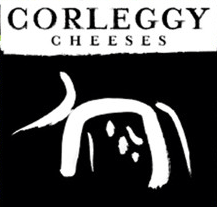
Corleggy Cheeses is an Irish cheese producer in County Cavan. It was started by Silke Cropp in 1985 using milk from her own goat herd. Today Corleggy make a variety of different cheese from goat's milk, sheep's milk and cow's milk sourced from local farmers.

Caprino is an Italian cheese traditionally made from whole or skimmed goat's milk. The name of the cheese derives from the Italian word for goat, capra. With modern methods of production, the cheese is made from cow's milk as well or a combination of both cow's and goat's milks. The two major styles of caprino are fresco (fresh) and stagionato (aged).

Cheeses in Mexico have a history that begins with the Spanish conquest, as dairy products were unknown in pre-Columbian Mesoamerica. The Spanish brought dairy animals, such as cattle, sheep, and goats, as well as cheesemaking techniques. Over the colonial period, cheesemaking was modified to suit the mixed European and indigenous tastes of the inhabitants of New Spain, varying by region. This blending and variations have given rise to a number of varieties of Mexican cheeses. These are most popular in the country, although European cheeses are made, as well. Almost all cheese in Mexico is made with cows’ milk, with some made from goats’ milk. More recently, efforts have been made to promote sheep's milk cheeses. Most cheeses are made with raw (unpasteurized) milk. Cheeses are made in the home, on small farms or ranches, and by major dairy product firms. Between 20 and 40 different varieties of cheese are made in Mexico, depending on how one classifies them. Some, such as Oaxaca and panela, are made all over Mexico, but many are regional cheeses known only in certain sections on the country. Some of the least common are in danger of extinction.
Carrigaline Farmhouse Cheese is a maker of semi-soft cheese made from cow's milk in Carrigaline, County Cork in Ireland. The O'Farrell family have produced cheeses on their farm in County Cork since 1988 using milk from their Friesian cow herd. The O'Farrell family business has since grown into a producer of artisan cheeses which have won several accolades and international cheese awards.

St Tola goats cheese is a range of handmade goat's milk cheese made in Inagh, County Clare. A range of cheese are produced varying from fresh soft cheese to a Gouda style hard cheese.
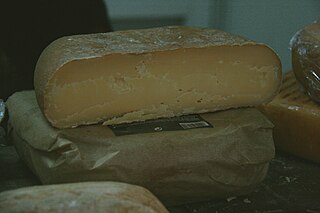
Mallorca cheese is a Spanish cheese made exclusively on the island of Mallorca, one of the Balearic Islands in the Mediterranean Sea. It has Protected Designation of Origin and is made from the pasteurized milk of cows, goats and/or sheep which live on the island. The cheeses are slightly tapering, flat cylinders which measure 12–20 cm (5-8 inches) across and 7-9 cm (3-4 inches) high. They weigh from 750 g to 4 kg (1.5-9 lbs). Mallorca cheese is produced in three types:
Fivemiletown Creamery is based in Fivemiletown, County Tyrone, Northern Ireland, and is a producer of handmade speciality soft cheeses and cheddars The company is a farmers' co-operative, and employs around 40 people. The creamery draws its milk supplies mostly from over 60 dairy farmers from across Northern Ireland. The company was founded in 1898 and added cheese production in 1972. Fivemiletown Creamery is the only speciality cheese maker in Northern Ireland. In 2014 Fivemiletown Creamery was acquired by Dale Farm.
Ardsallagh Goat Farm is located at Carrigtwohill, County Cork. Three types of cheese are made from their own herd and from locally sourced goat's milk. The cheeses are suitable for vegetarians.
References
- 1 2 3 McKenna, John. "Choice cheese". The Irish Times. Retrieved 2021-06-14.
- ↑ "Home Page". Bluebell Falls. Retrieved 2021-06-14.
- ↑ Department of Agriculture Registered Food Business Operators [ permanent dead link ]